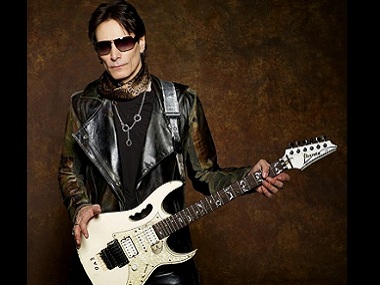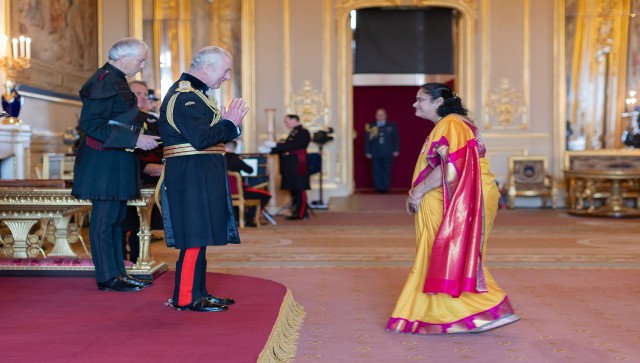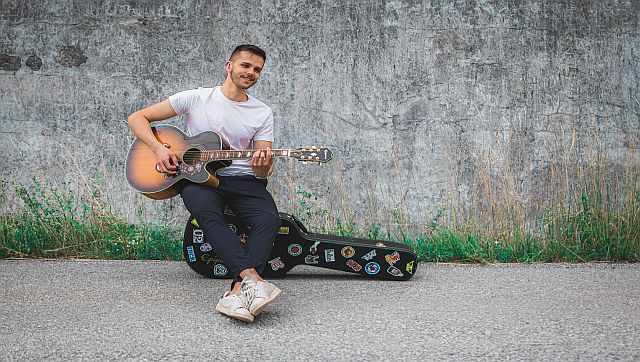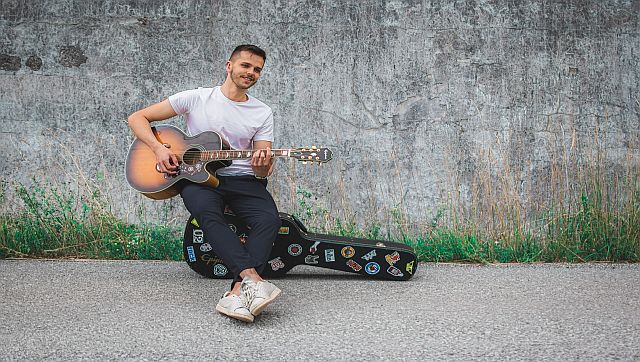He’s come to India three times in the past 20-odd years. Each time his visits have taken him to Beas, Amritsar. A follower of the Radha Soami Satsang (Beas), Steve Vai who has three Grammys to his credit and has sold over 15 million records, will finally be playing for the Indian audiences. Frequently counted among the greatest guitarists in the world, Vai is excited about his upcoming performance at the NH7 Weekender in Shillong over 28-29 October. He will return to India to play at the festival’s flagship Pune edition in December. “Some of my friends have played in India and they’ve said that it’s a fantastic experience. My previous trips to India have been to Beas and Delhi. I haven’t actually worked in India, but I have worked with Indian material. I’ve transcribed tapes, cleaned them up, worked on old recordings of Indian masters, restored some old satsang material,” says Vai.
Vai has had a fair bit of experience transcribing music, leading back to his days at Berklee College of Music. While at Berklee, Vai sent both a notated transcription of Frank Zappa’s The Black Page, and a recording of his college band to the legendary musician. Mighty impressed, Zappa invited Vai to work as a salaried transcriptionist. In the middle of his fourth semester, Vai moved to California to start his career as a session and touring artist for Zappa. “Not a day goes by when I don’t reflect on something I learnt from my time with Frank. The most important lesson I’ve learnt from him is to have the freedom to make whatever music you want. It’s such a simple lesson but so hard to do when one has to keep an eye on commercial success and pay cheques.”
Vai will be participating in the upcoming Frank Zappa hologram tour, put together by Eyellusion and the Frank Zappa Family Trust. He admits that initially he found the idea peculiar but now with a complete picture in mind of what the tour entails, Vai couldn’t be more thrilled. “People have a certain notion of what a hologram should be. But I gotta tell you, this is nothing one has ever thought about. It is truly extraordinary in scale and substance, and a riveting use of technological advancement to create a memorable experience.”
While Zappa has been a major driving force in Vai’s career, the virtuoso guitarist who has acquired stratospheric fame for his instrumental music has also collaborated with major vocalists on tours and albums. Among the most definitive frontmen to have jammed with Vai are David Lee Roth (Van Halen) and David Coverdale (Whitesnake). While a lot of these collaborative efforts have been in the earlier and mid stages of his career, would he today be open to the idea of sharing the stage with a maestro frontman? “The opportunity might just happen. I wouldn’t rule that out just yet. But it would have to be extraordinary. It would have to be with somebody who is ready to go where I want to go. My favourite singer to perform with is Devin Townshend. We have such a great working vibe… it’s seamless,” adds Vai.
Although his teaming up with major vocalists has received much appreciation, his greatest musical strides have been made while sharing the stage with multiple other guitarists. He strongly believes that the best kind of musician to jam with is one who is great at listening. “Someone who knows how to listen carefully, is good at exchanging ideas and being in the moment, would top my list of collaborators. (Joe) Satriani has an incredible ear. He is one of my favourites. As is Yngwie (Malmsteen). One part of the Generation Axe tour included him and jamming on Black Star with him is possibly my favourite sharing experience. He’s very open, and listens so carefully.”
The melodic experiences created have been legendary, though when you prod him a bit, Vai is candid about what can be the challenges of such a task. “The challenges vary according to a situation. With G3 it was so simple and easy. No challenges, all fun. With Generation Axe, the challenge was in organising the music, so it sounds like a cohesive group of five guitarists playing harmony together.”
Vai wears a lot of hats: as a guitarist, composer, producer, singer, and songwriter. When he isn’t touring or recording music, he also takes his role as a teacher very seriously. Admittedly his teachings about music are more esoteric, less academic. His focus remains greatly on one’s discovery of themselves in relation to their music, than the technical aspects of the craft. Even in the course of this conversation, he is free in his advice and candid in his introspection. Like a guitar-totting Gandalf, Vai is constantly egging you to discover your ear and not be bound by the expectations of industries and trends. “Instrumental guitar music is primarily attractive to people who are guitar players and those who love the instrument. The popularity of it, even in the time of EDM, is based on the inspiration of those who are making it. Before Jeff Beck started making instrumental guitar records, people would think ‘oh boy, there’s no room for this’. Beck changed that. Then Satriani and others like myself subsequently came along and made this our own. You need to prioritise doing what you find exciting, regardless of what anyone says, of what’s happening in the scene. Once you have that, everything else will fall in place.”
As a student of Berklee, Vai believes that it’s probably a good idea to have some functional training of the basics: notes, scales, chords, the works. That said, he feels the quality of one’s career rests solely on their attitude towards it. “Musical training is important if a student finds it interesting. The most important thing is the relationship between the melody in your head and your ideas, and your fingers or voice, depending on your choice of instrument. And that comes from developing your ear. Some people are more interested in theory, like me. I was composing music before I learnt to play the guitar. It’s not necessary to know anything about music to be an effective musician. Sometimes if a person becomes too fascinated with the music theory, what they create can sound very theoretical. Then again, someone who is completely ignorant of music theory, could find access to some of those delicious, luscious melodies and chord changes, crippling,” he says, sagely.
The maestro who begins his day with coffee with his wife, followed by meditation, still finds it imperative to practise guitar playing every day. He’s achieved much acclaim, received awards and pioneered various breakthroughs in the instrumental guitar space. Ask him if he has any unachieved dreams and milestones, he says: “My plan for now and the future is simple — Happy. Healthy. Happy. Healthy. Happy. Healthy. Dead,” he laughs. Tell him that sounds like a song’s refrain, and he breaks into peals of laughter. He repeats that slowly, processing it as a potential song, before saying, “You know, I’m going to think about this one.”


)




)
)
)
)
)
)
)
)